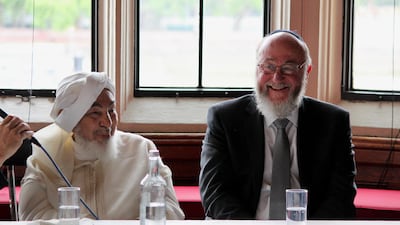A faith leader from Abu Dhabi attended a meeting in London to discuss a shared vision for peace and tolerance.
Islamic scholar Abdallah bin Bayyah met Ephraim Mirvis, 11th Chief Rabbi of the United Congregations of the Commonwealth, for a historic conversation covering Islamic-Jewish relations.
Mr bin Bayyah, founder of the Abu Dhabi Forum for Peace, opened discussions on how to build on values of equality and the rights of minorities at an event held at the House of Lords in London.
“Coexistence is the only option for this region and for the world,” said Mr bin Bayyah, who is also chairman of the UAE Fatwa Council.
“This is what reason, history, and the scriptures of all faiths teach us.
“I hope that the contribution of leaders to the spread of peace and harmony throughout the world will continue, and I wish the endeavour here today every success.”
The event, titled ‘Loving Kindness, Humanity and Flourishing as Faith Communities in the UK’, was the first partnered event between the Abu Dhabi Forum for Peace and the UK-based Office of the Chief Rabbi.
It emphasised the need to recognise shared values in the peace process.
One of the world’s leading experts on the principles of Islamic Law, or uṣūl al-fiqh, Mr bin Bayyah is widely recognised as a leading authority on the discourse of tolerance, having dedicated much of his career to illustrating harmony between national and religious identity as well as between Islam and other faiths.
Rabbi Mirvis said a new era of religious tolerance was under way since the historic signing of the Abraham Accords that normalised relations between the UAE and Israel in 2020.
“A historic paradigm shift in Muslim-Jewish relations is under way, harnessing the goodwill generated by a number of impressive new frameworks for dialogue,” he said.
“Seizing this opportunity is an urgent priority.
“We have a responsibility to build on the relationships that have been forged and to usher in a new era of engagement between our faith communities, in this country and beyond, for the benefit of the societies of which we are part.”


